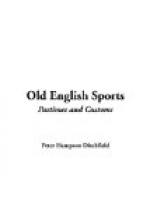The play is founded on the old classical story of Apollo and Daphne. The sun-god, Apollo, was charmed by the beauty of the fair Daphne, the daughter of a river-god, and pursued her with base intent. Just as she was about to be overtaken she prayed for aid, and was immediately changed into a laurel-tree, which became the favourite tree of the disappointed lover. The pageant founded on this old classical legend commenced with a man, who acted the part of Apollo, chasing a woman, who represented Daphne, followed by a young shepherd bewailing his hard fate. He, too, loved the fair and beautiful Daphne, but Apollo wooed her with fair words, and threatened him with diverse penalties, saying he would change him into a wolf, or a cockatrice, or blind his eyes. The shepherd in a long speech tells how Daphne was changed into a tree, and then Apollo is seen at the foot of a laurel-tree weeping, accompanied by two minstrels. The repentant god repeats the verse—
“Sing you, play you;
but sing and play my truth;
This tree my lute, these
sighs my note of ruth:
The laurel leaf for
ever shall be green,
And Chastity shall be
Apollo’s Queen.
If gods may die, here
shall my tomb be placed,
And this engraven, ‘Fond
Phoebus, Daphne chaste.’”
A song follows, and then, wonderful to relate, the tree opens, and Daphne comes forth. Apollo resigns her to the humble shepherd, and then she runs to her Majesty the Queen, and with a great deal of flattery wishes her a long and prosperous reign.
Such was the simple play which delighted the minds of our forefathers, and helped to raise them from sordid cares and the dull monotony of continual toil. In our popular amusements the village folk do not take part, except as spectators, and therefore lose half the pleasure; whereas in the time of the Virgin Queen the rehearsals, the learning the speeches by heart, the dresses, the excitement, all contributed to give them fresh ideas and new thoughts. The acting may not have been very good; indeed Queen Elizabeth did not always think very highly of the performances of her subjects at Coventry, and was heard to exclaim, “What fools ye Coventry folk are!” but I think her Majesty must have been pleased at the concluding address of the players at Sudeley. After the shepherds had acted a piece in which the election of the King and Queen of the Bean formed a part, they knelt before the real Queen, and said, “Pardon, dread Sovereign, poor shepherds’ pastimes, and bold shepherds’ presumptions. We call ourselves kings and queens to make mirth; but when we see a king or queen, we stand amazed. At chess there are kings and queens, and they of wood. Shepherds are no more, nor no less, wooden. In theatres workmen have played emperors; yet the next day forgotten neither their duties nor occupation. For our boldness in borrowing their names, and in not seeing your Majesty for our blindness, we offer these shepherds’ weeds: which, if your Majesty vouchsafe at any time to wear, it shall bring to our hearts comfort, and happiness to our labours.”




